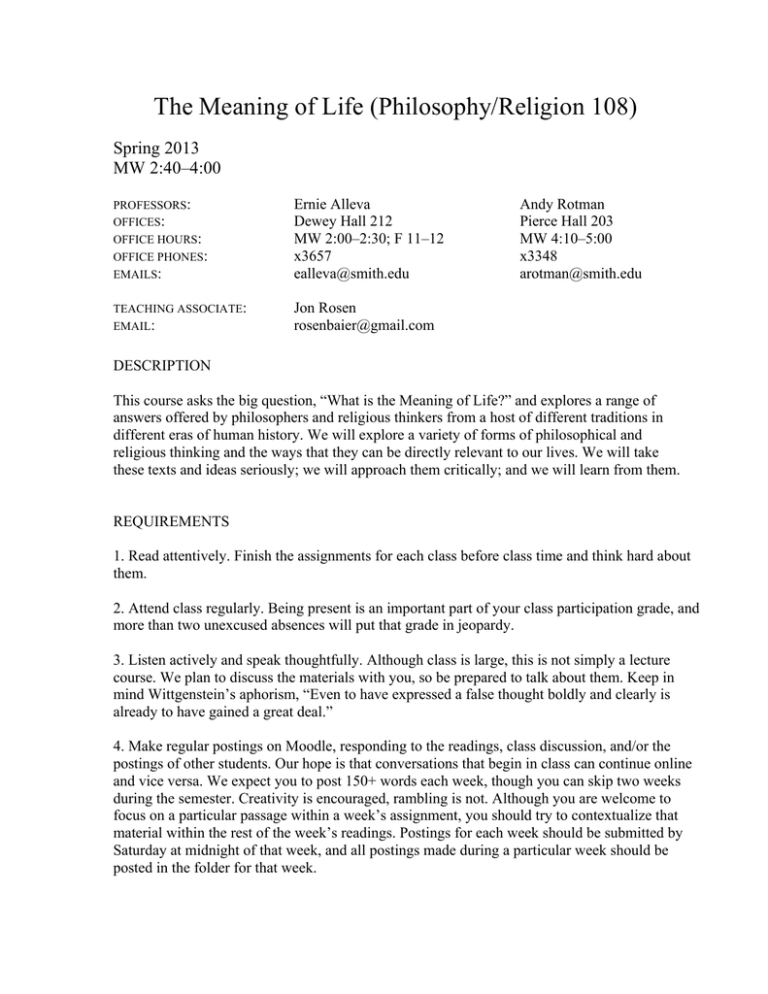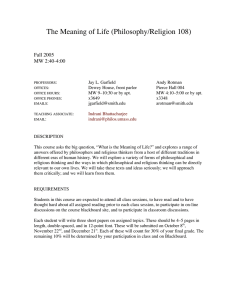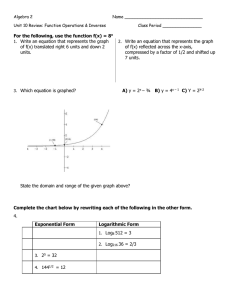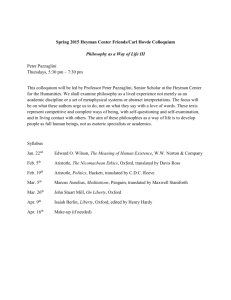The Meaning of Life (Philosophy/Religion 108) Spring 2013 MW 2:40–4:00
advertisement

The Meaning of Life (Philosophy/Religion 108) Spring 2013 MW 2:40–4:00 PROFESSORS: OFFICES: OFFICE HOURS: OFFICE PHONES: EMAILS: Ernie Alleva Dewey Hall 212 MW 2:00–2:30; F 11–12 x3657 ealleva@smith.edu TEACHING ASSOCIATE: EMAIL: Jon Rosen rosenbaier@gmail.com Andy Rotman Pierce Hall 203 MW 4:10–5:00 x3348 arotman@smith.edu DESCRIPTION This course asks the big question, “What is the Meaning of Life?” and explores a range of answers offered by philosophers and religious thinkers from a host of different traditions in different eras of human history. We will explore a variety of forms of philosophical and religious thinking and the ways that they can be directly relevant to our lives. We will take these texts and ideas seriously; we will approach them critically; and we will learn from them. REQUIREMENTS 1. Read attentively. Finish the assignments for each class before class time and think hard about them. 2. Attend class regularly. Being present is an important part of your class participation grade, and more than two unexcused absences will put that grade in jeopardy. 3. Listen actively and speak thoughtfully. Although class is large, this is not simply a lecture course. We plan to discuss the materials with you, so be prepared to talk about them. Keep in mind Wittgenstein’s aphorism, “Even to have expressed a false thought boldly and clearly is already to have gained a great deal.” 4. Make regular postings on Moodle, responding to the readings, class discussion, and/or the postings of other students. Our hope is that conversations that begin in class can continue online and vice versa. We expect you to post 150+ words each week, though you can skip two weeks during the semester. Creativity is encouraged, rambling is not. Although you are welcome to focus on a particular passage within a week’s assignment, you should try to contextualize that material within the rest of the week’s readings. Postings for each week should be submitted by Saturday at midnight of that week, and all postings made during a particular week should be posted in the folder for that week. 2 5. Write three short papers on assigned topics. These should be 5 pages in length, double-spaced, with 1-inch margins, and in a 12-point font. These will be submitted on the following dates: February 22, April 5, and May 7. In summary, you will be evaluated by your papers, each of which will count for 30% of your final grade, and your participation in class and on Moodle, which will count for the remaining 10% of your final grade. REQUIRED READING The Bhagavad Gita. Translated by Barbara Stoller Miller. Penguin Books, 2000. Nicomachean Ethics of Aristotle. Translated, with an introduction and notes, by Terence Irwin. 2nd edition. Indianapolis, IN: Hackett Publishing Company, 1999. Marcus Aurelius, The Meditations. Translated by G. M. A. Grube. Hackett Publishing Company, 1983. Lao Tzu, Tao Te Ching. Translated by D. C. Lau. Penguin Books, 1963. Leo Tolstoy, The Death of Ivan Ilyich. Translated by Lynn Solotaroff. New York & Toronto: Bantam books, 1981. Hannah Arendt, Eichmann in Jerusalem: A Report on the Banality of Evil. New York, NY: Penguin Books, 1994. H. H. Dalai Lama XIV, Ethics for the New Millennium. New York: Riverhead Books, 1999. Source Book. (=SB) The rest of the materials will be given to you as handouts, all of which will also be posted on Moodle. •texts are available at Grécourt Bookshop, 585–4140 •the source book is available at Paradise Copies, 21 Conz Street, (413) 585–0414 3 SYLLABUS WEEK 1 (1/28, 1/30) i. INTRODUCTION ii. When Should One Fight? •J. A. B. van Buitenen, trans. The Mahabharata: 1, The Book of the Beginning. Chicago and London: The University of Chicago Press, 1973. “The Mahabharata Introduction: The Central Story,” pp. xiii–xvi (handout) •Barbara Stoller Miller, trans. The Bhagavad Gita. Penguin Books, 1986. “Introduction—The Bhagavad Gita: Context and Text,” pp. 1–13 The First Teaching–The Second Teaching, pp. 21–39 SUPPLEMENTARY READINGS •R. C. Zaehner, trans. The Bhagavad Gita. New York: Oxford University Press, 1973. chapter introductions (handout) NOTE: You will find it helpful to read these chapter introductions along with each of the Teachings in Miller’s translation. For example, read Zaehner (pp. 120–122) and then Miller’s translation of The Second Teaching (pp. 29–39). WEEK 2 (2/4, 2/6) i. How Should One Act? •Barbara Stoller Miller, trans. The Bhagavad Gita. Penguin Books, 1986. The Third Teaching–The Ninth Teaching, pp. 41–87 ii. What Should One Think? •Barbara Stoller Miller, trans. The Bhagavad Gita. Penguin Books, 1986. The Tenth Teaching–The Eighteenth Teaching, pp. 89–154 WEEK 3 (2/11, 2/13) i. What Is Human Happiness? •Nicomachean Ethics of Aristotle. Translated, with an introduction and notes, by Terence Irwin. 2nd edition. Indianapolis, IN: Hackett Publishing Company, 1999. Books I, II, and III (chapters 1–9), pp. 1–45 ii. Why Is Being Virtuous So Difficult? •Nicomachean Ethics of Aristotle. Translated, with an introduction and notes, by Terence Irwin. 2nd edition. Indianapolis, IN: Hackett Publishing Company, 1999. Books VII and X (chapters 1–5), pp. 99–119, 153–161 NOTE: topic for first paper distributed 4 WEEK 4 (2/18, 2/20) i. What Is The Best Life? •Nicomachean Ethics of Aristotle. Translated, with an introduction and notes, by Terence Irwin. 2nd edition. Indianapolis, IN: Hackett Publishing Company, 1999. Books VIII (chapters 1–8), IX (chapters 3, 4, and 8–12), and X (chapters 6–9), pp. 119–129, 140–143, 146–153, and 162–171 ii. Why Do Bad Things Happen To Good People? (guest lecture by Joel Kaminsky) •The HarperCollins Study Bible: New Revised Standard Version with the Apocrypha/ Deuterocanonical Books. General editor, Wayne A. Meeks. Associated Editors, Jouette M. Bassler, et al. San Francisco: Harper San Francisco, 1993. The Book of Job, 749–796 (SB) 2/22: first paper due WEEK 5 (2/25, 2/27) i. How Does One Master Oneself? •Marcus Aurelius, The Meditations. Translated by G. M. A. Grube. Hackett Publishing Company, 1983. entire book ii. What Is The Way To Live? (guest lecture by Peter Gregory) • Lao Tzu, Tao Te Ching. Translated by D. C. Lau. Penguin Books, 1963. Book I, pp. 57–96 Book 2, 99–143 WEEK 6 (3/4, 3/6) i. How Does One Connect With God? •Nizam ad-din Awliya, Morals for the Heart. Translated by Bruce B. Lawrence. Introduction by Khaliq A. Nizami. New York: Paulist Press, 1992. Excerpts, pp. 3–15, 132–144, 173–181, 305–307 (SB) •Carl Ernst. In Religions of India in Practice. Edited by Donald S. Lopez. Princeton: Princeton University Press, 1995. “Conversations with Sufi Saints,” pp. 513–517 (SB) ii. What Is Enlightenment? •Immanuel Kant, Perpetual Peace and Other Essays on Politics, History, and Morals. Translated with an introduction by Ted Humphrey. Indianapolis: Hackett Publishing Company, 1983. “An Answer to the Question: What is Enlightenment?” pp. 41–48 (SB) 5 WEEK 7 (3/11, 3/13) i. What Is Left Of It? •Friedrich Nietzsche, Twilight of the Idols. Translated, with and Introduction and Commentary, by R. J. Hollingdale. Penguin Book, 1968. Introduction, pp. 7–17 (SB) Excerpts, pp. 23–59, 85–96 (SB) ii. What Are Our Obligations? •Singer, Peter. In Practical Ethics. 3rd edition. Cambridge University Press. “Rich and Poor,” 191–215 (SB) WEEK 8 (3/18, 3/20,) RELAX . . . SPRING BREAK WEEK 9 (3/25, 3/27) i. What Is Truth? •Dalton, Dennis, ed. Mahatma Gandhi: Selected Political Writings. Indianapolis and Cambridge: Hackett Publishing Company, Inc., 1996. “Introduction,” pp. 3–25 (handout) “Part 1: Satyagraha: The Power of Nonviolence,” pp. 29–64, 81–91 (handout) ii. What Does My Death Mean? •Leo Tolstoy, The Death of Ivan Ilyich. Translated by Lynn Solotaroff. New York & Toronto: Bantam books, 1981. complete story, pp. 35–134 NOTE: topic for second paper distributed WEEK 10 (4/1, 4/3) i. What Could We Become? •Washington, James Melvin. A Testament of Hope: The Essential Writings of Martin Luther King, Jr. San Francisco: Harper & Row, 1986. Excerpts, pp. xi–xxiii, 12–15, 35–40, 217–220, 259–267, 279–286, 289–302 (SB) ii. What Is This World? (guest lecture by Rick Millington) •Dickinson, Emily. The Complete Poems of Emily Dickinson, edited by Thomas H. Johnson. Harvard University Press, 1955. Selections, 1–13 (SB) 4/5: second paper due 6 WEEK 11 (4/8, 4/10) i. What Is Evil? •Hannah Arendt, Eichmann in Jerusalem: A Report on the Banality of Evil. New York, NY: Penguin Books, 1994. Excerpts, pp. 3–67, 83–111 ii. How Abnormal Is Serious Evil? •Hannah Arendt, Eichmann in Jerusalem: A Report on the Banality of Evil. New York, NY: Penguin Books, 1994. Excerpts, pp. 112–150, 220–279 WEEK 12 (4/15, 4/17) i. How Does One Live With Compassion? •H. H. Dalai Lama XIV, Ethics for the New Millennium. New York: Riverhead Books, 1999. Chapters 1–8, pp. 3–131 ii. How Does One Live With Compassion? •H. H. Dalai Lama XIV, Ethics for the New Millennium. New York: Riverhead Books, 1999. Chapters 9–16, pp. 133–237 WEEK 13 (4/22, 4/24) i. How Does One See the Divine? •John Fire/Lame Deer and Richard Erdoes, Lame Deer: Seeker of Visions. New York, Simon and Schuster, 1972. Chapters 1, 3, 7, pp. 11–17, 42–71, 119–138 + photographs (SB) NOTE: topic for third paper distributed ii. What Is Supreme Love? •John Coltrane, A Love Supreme. Impulse Records, 1964 & 1965. (Moodle) NOTE: Listen repeatedly! •Ashley, Kahn, A Love Supreme: The Story of John Coltrane’s Signature Album. Penguin Books, 2002. “Poetry and Prayer, 144–147 (SB) 7 WEEK 14 (4/29, 5/1) i. Do We Get a Second Chance? Can Happiness be an Illusion? IN-CLASS SCREENING: “Reality Check.” SCREENING OUTSIDE OF CLASS: The Seven Samurai (Shichinin no samurai). Directed by Akira Kurosawa. Written by Akira Kurosawa, Shinobu Hashimoto, and Hideo Oguni. 203 minutes. 1954. NOTE: Sunday and Monday, 7 pm (location to be announced) AND, IF YOU CAN MAKE IT: Tuesday, W. S. Merwin Poetry Reading! ii. What Is The Meaning Of Life? discussion of The Seven Samurai 5/7: third paper due


